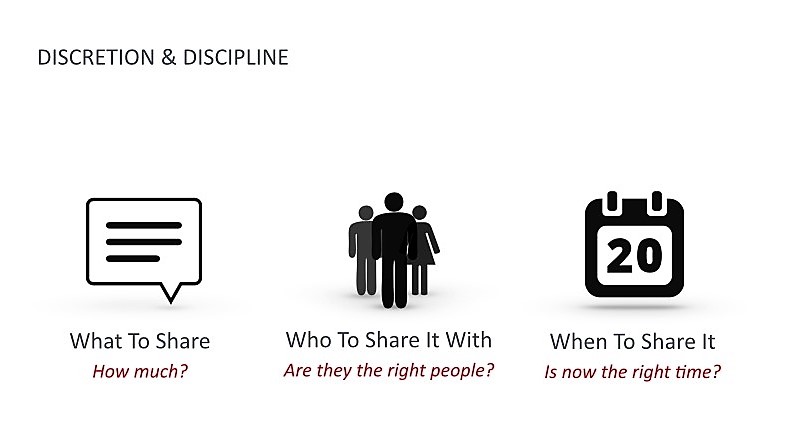By Rick Shallenberger (Regional Pastor and GCI Equipper writer)
This is part 6 of a series on Christian leadership. For other articles in the series, click a number: 1, 2, 3, 4, 5, 7, 8.

Let’s be honest—it is both fun to be “in the know” and a temptation to share what we know with others. This reality raises the important issue of confidentiality.
I remember the day I got engaged. I couldn’t wait to go to work and inform everyone (this was before texting, email, Twitter, Snapchat and Facebook). I also remember when my wife told me she was pregnant, and I wanted to tell everyone right away. We decided to wait, and that was difficult. It seems that good news is anxious to be told!
There are appropriate times for telling others things they don’t already know. But there are also times when what we know should not be shared. Maintaining confidentiality is a must for pastoral and ministry leaders. Breaches of confidentiality can be costly, leading to hurt feelings and even shattered relationships.
GCI’s leadership consultant, GiANT Worldwide, provides a simple tool I wish I’d had years ago (it would have helped me avoid some breaches of confidentiality). I want to share this tool with you, hoping it will be of help. Called “Discretion & Discipline,” it’s illustrated in this diagram:

This tool, which applies to the sharing of all types of information, leads us to consider three issues: 1) What to share (how much?) 2) Who to share it with (are they the right people?) and 3) When to share it (is now the right time?). An example will help. Say you are in a conversation with your supervisor and she shares that she hopes to implement a new training program this year with a few key leaders, and she is also considering promoting a couple of those leaders. You walk out of the room feeling good about this new direction, and since your supervisor didn’t say anything about confidentiality, you share that information with a few people. Of course, some of them share it with a few others.
A few days later you run into your supervisor in the hall and she expresses her frustration that word got out about her idea and rumors about who is being promoted are now running rampant. “It’s out of control,” she laments, and you must admit it’s partly your fault. The entire scenario could have been avoided by prayerfully considering the three issues addressed in the diagram above. Let’s look a bit closer at each issue.
What to share
A good starting point is to ask if this information is yours to share. Far too often we fail to ask, “Do I have permission to share this?” “Is this information confidential?” Just because the person who shares the information with you does not say that it is confidential, does not mean you have the right to share it. In fact, we’re better off assuming confidentiality. We should always ask, “Is this OK to share?”
Who to share it with
Even when we have permission to share something, it’s important to consider whom we share the information with. Minimizing the number is usually the key. Only share the information with those who need to know (and when you do, tell them of any confidentiality considerations).
This is vital when working with your pastoral team, advisory council and finance committee. Sometimes the finance committee will need to know something the advisory council doesn’t need to know. Sometimes things may be shared with the pastoral team that don’t need to be shared elsewhere. An effective leader knows who needs to know the information and then acts accordingly, starting with the smallest group, then expanding to others as needed. In making such determinations, asking a simple question can save much grief: “This is good information; may I share it with so and so?”
When to share it
So, you’ve received permission to share the information and you know who needs it. The next issue to consider is the timing. When is the best time to share this information? Is the person receptive? Is their mind on something else, and thus unable to appreciate what you are about to share?
Let me make this point using a bit of humor: a best man should not announce his engagement while raising a toast to the newly married couple. Though it’s good news you want to share with a lot of people, the timing is not right. Here’s another example: I heard of an employer who announced to his staff that there were going to be layoffs. “The good news,” he said, “is those who aren’t being laid off are getting a bonus.”
Maintaining appropriate confidentiality in ministry is vital and it should always be accompanied with prayer. Sometimes it’s not clear what to share, who to share it with, and when to share it. Always pray about it, asking God for wisdom and discernment. In most situations where confidentiality is involved, less is best. Keep in mind the popular THINK before you speak acronym:
- T – Is it true?
- H – Is it helpful?
- I – Is it inspiring?
- N – Is it necessary?
- K – Is it kind?



Thank you for your article Rick. This is most important for our consideration in any area of life but especially in the church.
Very good advice. God is all about relationship. Trust is key. A few ill timed words can destroy what it took years to build, and they there may not be enough years left in a lifetime to build back.
Very good advice,thank you very much
Thanks. I hope it’s good to share it to members.
Appreciate the good thoughts Rick!